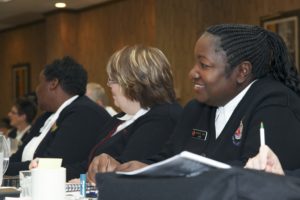
Forget the former things; do not dwell on the past. See, I am doing a new thing! Now it springs up; do you not perceive it? I am making a way in the wilderness and streams in the wasteland.” Isaiah 43: 18-19
Major Janice Love led the multi-cultural ministries bureau (now intercultural ministries department) in the Central Territory in the early twentieth-first century. Focused on her task, she brought racial reconciliation to the forefront, and she developed cultural awareness programming to share with corps across the region. She legitimized the program with a valiant heart and a determined spirit.
Young Janice Love followed her sister into a Salvation Army corps building in Iowa, where she first learned of the Army through the after-school programs. She soon joined the sunbeams, a youth character building program. At age fourteen, Janice realized The Salvation Army was more than after school programs and sunbeams; it was a church. She attended a meeting and immediately liked the format and the uniforms, especially the hats! Growing up in the Methodist Church, the ladies Janice attended church with wore more elaborate hats, but she thought the Army’s hat was smart. After some discussion with her father, he agreed she could attend The Salvation Army services if she also attended the Methodist church.

At 16, Janice began working at Gene Eppley Camp in Nebraska. “It was,” she said, “the strategic plan of then Captain Bonifield, famously called ‘Dad B,’ he brought young people to camp onto the camp staff, and 50 to 60% of those kids became officers. It was his recruitment.”
Janice loved her time at camp, and Captain Bonifield encouraged her to become an officer, but she did not recognize herself in the officers she worked and worshipped alongside. At the age of 16 she knew she wanted to be a social worker and minister but did not believe an African American girl could become an officer of The Salvation Army. However, that all changed in 1978 when Janice met an African American corps officer, Captain Vivian Taylor (now Major Vivian F. Childs), at the Omaha (North), NE Corps. She now knew it was possible for her.
At age 18, Janice asked her father if she could apply for Salvation Army officership, knowing if he said no, she would not apply. He agreed, but early in her officership, he shared his reservation. He was worried for her safety. In 1981, there was still racial segregation.
Commissioned in 1985, Lieutenant Janice spent five years in Michigan at various appointments. In 1997, She was called to the Central Territory Headquarters (THQ) to serve as the multi-cultural ministries bureau (now intercultural ministries department) director. She followed in the footsteps of Major Diane Harper, the first Black officer to hold this position.
Major Janice’s first goal was to legitimize the bureau through new programs and make people aware of it. At times she felt alone because she was the only Black officer at THQ, but she had good leaders in Colonel Eleanor Norris, Lt. Colonel Mary Petroff, Lt. Colonel Cheryle Benson, and Major Barry Swanson; all of whom supported her work. One of the first programs she created was Racial Reconciliation Sunday, which later became Cultural Awareness Week. This program addressed racial issues within the Army. It was meant to make people uncomfortable and acknowledge the disruption of fellowship by using scripture and encouraging Bible Study to restore unity. The Eastern Territory had successfully braved these issues, and it was the right time for the Central Territory to do the same.
The program was distributed throughout the Territory and other Salvation Army ministries such as women’s ministries and youth programs. Major Janice knew that Cultural Awareness Week would impact but would take time to gain widespread acceptance.
At the Kansas City (Eastside), MO Corps Major Janice feeds hundreds of people weekly, but she does so much more. She offers a family connection to community members, saying, “African American (Urban) Ministry is about connection and family, however that family may look.”




